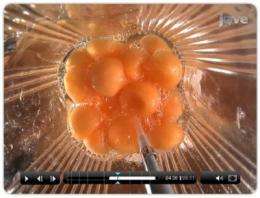The electronic nose knows when your cantaloupe is ripe

Have you ever been disappointed by a cantaloupe from the grocery store? Too ripe? Not ripe enough? Luckily for you, researchers from the University of California, Davis might have found a way to make imperfectly ripe fruit a thing of the past. The method will be published on March 30 in the Journal of Visualized Experiments (JoVE).
"We are involved in a project geared towards developing rapid methods to evaluate ripeness and flavour of fruits," said paper-author Dr. Florence Negre-Zkharov. "We evaluated an electronic nose to see if it can differentiate maturity of fruit, specifically melons. The goal is to develop a tool that can be used post-harvest to better evaluate produce, and develop better breeds."
When fruit ripens, it develops a characteristic volatile blend, indicating its maturity. Traditionally, the gold-standard of evaluating these volatiles has been gas chromatography, but it takes up to an hour to analyze a single sample, which makes it impractical to use outside the lab. Dr. Negre-Zakharov and her team wanted to determine if the much cruder— but much faster— electronic nose was able to determine if the melon they used in the experiment were ripe. It was.
"It's quite encouraging technology for the purposes of determining maturity," she said.
The project is part of the Specialty Crops Research Initiative, funded by the United States Department of Agriculture, which was "established to solve critical industry issues through research and extension activities." Dr. Negre-Zkharov and her team are working on quantitative methods of evaluating fruit-ripeness in the hopes that it will help the industry produce better quality produce.
"It's very impressive that the electronic nose system can do a type of gas chromatography in about a minute. Ultra-fast, indeed. Also, the sample preparation is as easy as making a smoothie at home. Such a user-friendly system could greatly help analysis efficiency in this field," said JoVE Science Editor, Dr. Zhao Chen. "I expect many researchers will know and adopt this method in their own research."
The next step is to take the electronic nose out into the field to determine if it can still determine fruit maturity with all of the background smells interfering— like soil and air-quality. Though the team has already tested the device in the field, they have not yet analyzed their results.
More information: To watch the full video article, please click here: www.jove.com/video/3821/fruit- … g-an-electronic-nose
Journal information: Journal of Visualized Experiments
Provided by The Journal of Visualized Experiments

















